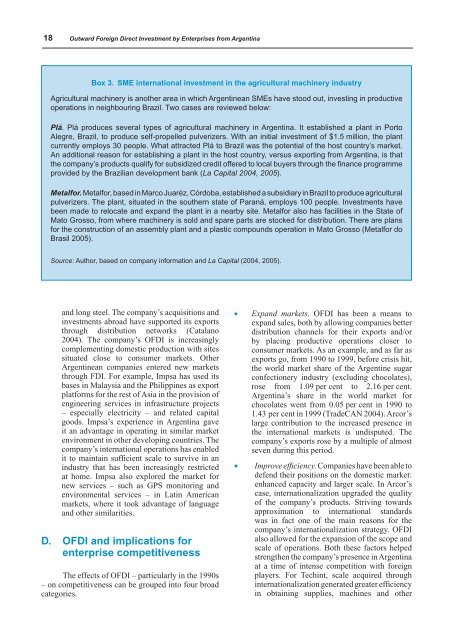Global Players from Emerging Markets: Strengthening ... - Unctad
Global Players from Emerging Markets: Strengthening ... - Unctad
Global Players from Emerging Markets: Strengthening ... - Unctad
You also want an ePaper? Increase the reach of your titles
YUMPU automatically turns print PDFs into web optimized ePapers that Google loves.
18 Outward Foreign Direct Investment by Enterprises <strong>from</strong> Argentina<br />
Box 3. SME international investment in the agricultural machinery industry<br />
Agricultural machinery is another area in which Argentinean SMEs have stood out, investing in productive<br />
operations in neighbouring Brazil. Two cases are reviewed below:<br />
Plá. Plá produces several types of agricultural machinery in Argentina. It established a plant in Porto<br />
Alegre, Brazil, to produce self-propelled pulverizers. With an initial investment of $1.5 million, the plant<br />
currently employs 30 people. What attracted Plá to Brazil was the potential of the host country’s market.<br />
An additional reason for establishing a plant in the host country, versus exporting <strong>from</strong> Argentina, is that<br />
the company’s products qualify for subsidized credit offered to local buyers through the finance programme<br />
provided by the Brazilian development bank (La Capital 2004, 2005).<br />
Metalfor. Metalfor, based in Marco Juaréz, Córdoba, established a subsidiary in Brazil to produce agricultural<br />
pulverizers. The plant, situated in the southern state of Paraná, employs 100 people. Investments have<br />
been made to relocate and expand the plant in a nearby site. Metalfor also has facilities in the State of<br />
Mato Grosso, <strong>from</strong> where machinery is sold and spare parts are stocked for distribution. There are plans<br />
for the construction of an assembly plant and a plastic compounds operation in Mato Grosso (Metalfor do<br />
Brasil 2005).<br />
Source: Author, based on company information and La Capital (2004, 2005).<br />
and long steel. The company’s acquisitions and<br />
investments abroad have supported its exports<br />
through distribution networks (Catalano<br />
2004). The company’s OFDI is increasingly<br />
complementing domestic production with sites<br />
situated close to consumer markets. Other<br />
Argentinean companies entered new markets<br />
through FDI. For example, Impsa has used its<br />
bases in Malaysia and the Philippines as export<br />
platforms for the rest of Asia in the provision of<br />
engineering services in infrastructure projects<br />
– especially electricity – and related capital<br />
goods. Impsa’s experience in Argentina gave<br />
it an advantage in operating in similar market<br />
environment in other developing countries. The<br />
company’s international operations has enabled<br />
it to maintain sufficient scale to survive in an<br />
industry that has been increasingly restricted<br />
at home. Impsa also explored the market for<br />
new services – such as GPS monitoring and<br />
environmental services – in Latin American<br />
markets, where it took advantage of language<br />
and other similarities.<br />
D. OFDI and implications for<br />
enterprise competitiveness<br />
The effects of OFDI – particularly in the 1990s<br />
– on competitiveness can be grouped into four broad<br />
categories.<br />
• Expand markets. OFDI has been a means to<br />
expand sales, both by allowing companies better<br />
distribution channels for their exports and/or<br />
by placing productive operations closer to<br />
consumer markets. As an example, and as far as<br />
exports go, <strong>from</strong> 1990 to 1999, before crisis hit,<br />
the world market share of the Argentine sugar<br />
confectionery industry (excluding chocolates),<br />
rose <strong>from</strong> 1.09 per cent to 2.16 per cent.<br />
Argentina’s share in the world market for<br />
chocolates went <strong>from</strong> 0.05 per cent in 1990 to<br />
1.43 per cent in 1999 (TradeCAN 2004). Arcor’s<br />
large contribution to the increased presence in<br />
the international markets is undisputed. The<br />
company’s exports rose by a multiple of almost<br />
seven during this period.<br />
• Improve efficiency. Companies have been able to<br />
defend their positions on the domestic market:<br />
enhanced capacity and larger scale. In Arcor’s<br />
case, internationalization upgraded the quality<br />
of the company’s products. Striving towards<br />
approximation to international standards<br />
was in fact one of the main reasons for the<br />
company’s internationalization strategy. OFDI<br />
also allowed for the expansion of the scope and<br />
scale of operations. Both these factors helped<br />
strengthen the company’s presence in Argentina<br />
at a time of intense competition with foreign<br />
players. For Techint, scale acquired through<br />
internationalization generated greater efficiency<br />
in obtaining supplies, machines and other

















